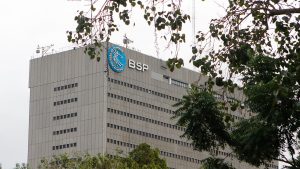




January Economic Update: Growth slows, prices rise
 DOWNLOAD
DOWNLOAD

Inflation Update: Up, up, and away?
 DOWNLOAD
DOWNLOAD

Quarterly Economic Growth Release: Growth takes on a slower pace
 DOWNLOAD
DOWNLOAD


Yields on term deposits rise on oil, rate hike bets

YIELDS on the term deposits of the Bangko Sentral ng Pilipinas (BSP) ended higher on Wednesday as global oil prices settled among one-month highs and with the market anticipating more rate hikes from monetary authorities.
Bids for the term deposit facility (TDF) of the central bank amounted to PHP 430.617 billion, going beyond the PHP 390-billion offer as well as the PHP 362.594 billion in tenders for a PHP 360-billion offer a week earlier.
“The BSP raised the volume offering in the TDF auction to PHP 390 billion, from PHP 360 billion last week. The total offer volume was allocated between the 7-day and 14-day tenors at PHP 230 billion (from PHP 200 billion) and PHP 160 billion (same as last week), respectively,” BSP Deputy Governor Francisco G. Dakila, Jr. said in a statement on Wednesday.
Broken down, the seven-day papers fetched bids amounting to PHP 237.656 billion, higher than the PHP 230 billion auctioned off by the BSP. This was also higher than the PHP 206.804 billion in tenders for a PHP 200-billion offering logged in the previous auction.
Banks asked for yields ranging from 6.2445% to 6.42%, a narrower margin compared with the 6.075% to 6.4% band seen a week ago. This caused the average rate of the one-week paper to rise by 4.62 basis points (bps) to 6.3322% from 6.286%.
Meanwhile, the 14-day papers fetched tenders amounting to PHP 192.961 billion, higher than the PHP 160-billion offer as well as the PHP 155.790 billion in bids seen the previous week.
Accepted rates for the papers were from 6.2445% to 6.5%, slimmer than the 6.2% to 6.6% range seen on Dec. 28. With this, the average rate of the two-week papers inched up by 3.77 bps to 6.4180% from 6.3803% in the previous week’s auction.
The central bank has not auctioned 28-day term deposits for more than two years to give way to its weekly offering of securities with the same tenor.
The term deposits and the 28-day bills are used by the BSP to mop up excess liquidity in the financial system and to better guide market rates.
“The results of the TDF auction came as eligible counterparties brought back their cash to the BSP’s facilities after the holidays. Going forward, the BSP’s monetary operations will remain guided by its assessment of the latest liquidity conditions and market developments,” Mr. Dakila said.
Term deposit yields also rose this week due to higher oil prices, Rizal Commercial Banking Corp. Chief Economist Michael L. Ricafort said in a Viber message.
Oil edged lower on Wednesday after slumping in the previous session, weighed by concerns on weak demand, Reuters reported.
Brent futures for March delivery fell 13 cents to USD 81.97 a barrel, a 0.1% loss, by 0511 GMT. US crude dropped 28 cents or 0.3%, to USD 76.65 per barrel. Both benchmarks plunged more than 4% on Tuesday, with Brent suffering its biggest one-day loss in more than three months.
Mr. Ricafort said global oil prices are still near one-month highs, and this could lead to some pickup in global inflation that could prompt further rate hikes from central banks worldwide, such as the US Federal Reserve.
The US central bank raised interest rates by 50 basis points (bps) in December after four straight 75-bp rate hikes. This brought the fed funds rate to a range of 4.25% to 4.5% in 2022.
The market also factored in hawkish signals from the BSP, Mr. Ricafort said.
BSP Governor Felipe M. Medalla earlier said the central bank could still hike policy rates this year to tame inflation. The BSP raised borrowing costs by 350 bps last year. — Keisha B. Ta-asan with Reuters
This article originally appeared on bworldonline.com





 By BusinessWorld
By BusinessWorld